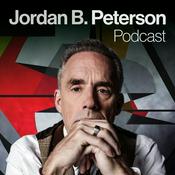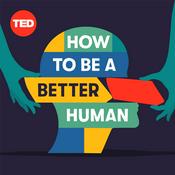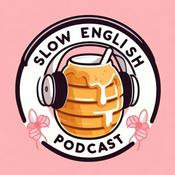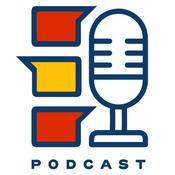34 episódios
- Hello my lovely English learners! Lori here, your teacher from BetterAtEnglish.com. I love technology, so we’re talking about robots today, but not in the way you might expect. A lot of conversations about robots have to do with whether or not a robot or machine could ever develop genuine feelings or emotions. But today we’re going to be thinking about our own emotions and feelings toward robots, particularly empathy. Can we feel empathy toward robots? And if so, why?
Links to pre-listening background -- to get the most out of this podcast:
Short video of someone “torturing” a robot dinosaur (part of a research experiment). Make sure you watch it with sound. What do you feel as you watch this?
https://www.youtube.com/watch?v=wAVtkh0mL20
Kate Darling: Why we have an emotional connection to robots (TED talk)
https://www.ted.com/talks/kate_darling_why_we_have_an_emotional_connection_to_robots?language=en
Yasmin's profile on italki
Full transcript of this episode
Allow me to introduce you to Kate Darling. She is a super cool researcher who is looking into this very question. I’m going to play you a little bit from the beginning of her TED talk, where she explains how she got into this line of research. The link to the full presentation is in the show notes. It’s as entertaining as it is interesting and thought provoking, so I can wholeheartedly recommend you check out the whole thing. OK, here comes Kate:
Kate Darling:
“There was a day, about 10 years ago, when I asked a friend to hold a baby dinosaur robot upside down. It was this toy called a Pleo that I had ordered, and I was really excited about it because I've always loved robots. And this one has really cool technical features. It had motors and touch sensors and it had an infrared camera. And one of the things it had was a tilt sensor, so it knew what direction it was facing. And when you held it upside down, it would start to cry. And I thought this was super cool, so I was showing it off to my friend, and I said, "Oh, hold it up by the tail. See what it does." So we're watching the theatrics of this robot struggle and cry out. And after a few seconds, it starts to bother me a little, and I said, "OK, that's enough now. Let's put him back down." And then I pet the robot to make it stop crying.
And that was kind of a weird experience for me. For one thing, I wasn't the most maternal person at the time. Although since then I've become a mother, nine months ago, and I've learned that babies also squirm when you hold them upside down. (Laughter)
But my response to this robot was also interesting because I knew exactly how this machine worked, and yet I still felt compelled to be kind to it. And that observation sparked a curiosity that I've spent the past decade pursuing. Why did I comfort this robot? And one of the things I discovered was that my treatment of this machine was more than just an awkward moment in my living room, that in a world where we're increasingly integrating robots into our lives, an instinct like that might actually have consequences, because the first thing that I discovered is that it's not just me.”
She’s right, it’s not just her. I found a short video on Youtube that shows somebody being really mean to the same type of robot dinosaur that Kate uses in her research. It’s only one minute long, so if you want to pause the podcast and go watch it, feel free. The link is in the show notes. Anyway, when I watched this video myself I felt really uncomfortable, even though I knew it was just a toy robot. I’m not alone; here are some of the Youtube comments.
“Why would you do this!!!! It looks so scared, please stop and let me hug it.”
“The last part when he was hitting him to the table I heard it crying; that’s so sad.”
“I feel bad for him, although I know it’s just a pile of plastic and metal that can’t even think.”
Of course, Youtube comments being what they are, - Episode summary
Autumn is in full swing here in the northern hemisphere, so this Real English Conversations episode is full of vocabulary related to the colors, weather, moods and feelings associated with this time of year. Lori and her friend Eliza talk about exercising outdoors, the health benefits of spending time out in nature, and whether or not it’s a good idea to pick and eat wild mushrooms. Are you feeling tired and drained? Grab your audio player and some headphones, get yourself to a park or forest, and have a nice walk while practicing your English listening! I guarantee you'll feel better after you do this than you did when you started. :-)
Get in touch with Eliza
Eliza on Udemy
Eliza’s instagram
Eliza’s teacher profile on italki
Supplementary material for further study
How nature affects our health and well-being
https://www.takingcharge.csh.umn.edu/how-does-nature-impact-our-wellbeing
What is leaf peeping? Read this article in The Guardian and find out. Includes a wealth of adjectives related to being outdoors in the autumn.
https://www.theguardian.com/environment/2020/oct/09/autumn-colour-brings-joy-to-uks-growing-band-of-leaf-peepers
This article explains how you can boost your mood by spending time in nature
https://www.health.harvard.edu/mind-and-mood/sour-mood-getting-you-down-get-back-to-nature
TRANSCRIPT PREVIEW
Hi English learners! Lori here, your teacher from Betteratenglish.com. Wherever and whenever you happen to be listening to this I hope you’re doing great. I’m recording this in early November 2020, and if you aren’t living out in the bush somewhere with no connection to the outside world, you’re probably aware that it’s a pretty stressful time. So because the past few episodes I’ve given you have been about rather heavy topics, I thought I’d give you something lighter for a change.
A couple of weeks ago I recorded a fun conversation with another English teacher. Her name is Eliza and she is from Belarus. She’s not a native speaker of English, but her English is fantastic. I really enjoyed talking to Eliza, and I think you’ll agree that her infectious enthusiasm and positivity really shine in this conversation. And I also think that teachers who are not native speakers of the language they teach have a deep understanding of what it’s actually like to learn that language, and that this can really benefit their students. I often wish that I could somehow experience learning English like a non-native speaker, just so I would have insight into what it’s really like. Eliza teaches online at italki, so if you feel like your personalities would click and you want to get in touch with her about lessons, you’ll find her italki profile linked the show notes.
All right, the conversation you’ll hear is actually the very first time Eliza and I ever spoke. So I start off by asking her about how she learned English, because I was really curious about that. What follows is a great example of a typical informal conversation in English between two people who don’t know each other, but who at least have some things in common. Becoming conversational in a foreign language is really difficult because conversations are completely unpredictable. There’s no way that you can prepare in advance for everything that might happen in a conversation. As you’ll hear, Eliza and I cover quite a range of topics. We talk about how Eliza learned English as a child, then move on to the health benefits of spending time outside, our favorite seasons, and even whether or not it’s a good idea to pick and eat wild mushrooms.
Here in the northern hemisphere it’s autumn, or fall, right now, so there is a lot of vocabulary related to the colors, the weather and the feelings and moods of autumn. And hey, I even learned a new English expression from this conversation...listen and see if you can hear what that was. And if you’re interested in grammar there is a great example of the use of the modal verb would ... - When you watch the news these days, do you trust your eyes and ears? Do you think what you’re seeing is real and happened the way it is being shown? Or is your first reaction to think: Hmm, I wonder if this video is fake? That’s what today’s episode is about, so stay tuned.
TRANSCRIPT PREVIEW - Get the full transcript here: https://www.betteratenglish.com/053-is-seeing-believing-deepfakes-and-the-information-apocalypse-transcript
Before we get started, I hope you’ll indulge me in a little Better at English background info. I don’t do Better at English for the money, but some of you have been going out of your way to send me thank-you gifts. So thank you so much to Charles for his very generous Paypal donation, and to the mystery person who sent me the Handbook of Self-Determination research from my Amazon wish list. I honestly didn’t know that it was even possible to find my Amazon wish list anymore, so getting a mystery book delivered was a real surprise! I’d also like to thank Zhuo Tao (I hope I’m saying that right) who wrote my favorite review this month: It goes like this “This podcast is getting better and better by every episode. It’s no longer just some language learning material, but food for thought as well.” That is indeed what I’m trying to do, so that was really nice to get that feedback.
You can say thanks here: https://www.betteratenglish.com/support-better-at-english
All feedback from you lovely listeners, whether it’s reviews, email, voice messages, donations, Amazon wish list gifts...it’s all positive feedback that fuels my motivation to keep doing this...it’s a sign that you’re getting value from the episodes, which is what it’s all about. So thank you!
OK, thank you for indulging me...let’s get on with today’s topic.
Deepfakes and the Information Apocalypse
Today we’re looking at misinformation and disinformation in our modern age, and how technologies like deepfake are making it increasingly harder for us to know what is really happening in the world, to separate fact from fiction. This episode builds on my earlier episodes about AI—that’s artificial intelligence—which you can find further down the podcast feed as episodes 47 and 48.
Before we go any further, take a moment to ask yourself how much you trust what you see, hear, and read these days, whether it’s online, in a newspaper, or coming from an expert or politician in a live televised address. Is seeing believing, as the expression goes? Go ahead, think of some recent examples that are personally relevant to you. Now ask yourself how your beliefs about what is true influence your actions, how much they shape what you actually do as you move through life. How do these beliefs influence, for example, who you vote for, what you buy, what you eat, which books you read, which car you drive?
You don’t need to be a Ph.D. in psychology to understand that our beliefs about what is true or false affect our actions. Nobody wants to make decisions based on lies or misinformation, so we all want information that we can trust. Just to give a current example, look at what’s happening regarding masks and the Corona-virus. If you think masks do help stop the spread and protect others, you’re likely to wear one even though they are uncomfortable and it’s kind of a pain in the butt. And if you think masks don’t help at all, you are more likely to resist wearing a mask or even flat out refuse. I mean, why bother if they don’t work, right? And if you have really strong beliefs about this, you might even march in protest against the rules that require you to wear a mask. The point is, your chosen path will be based on what you believe is right and true.
We are living in a pretty crazy time right now, and humanity is facing huge challenges. And it’s no secret that many of the big issues are extremely polarizing. And if you try to build an informed opinion by examining the information and arguments of both sides, - Talking about fat and fat bodies is a tricky area to navigate in English because the word FAT is so laden with meaning, associations, emotions, and feelings -- and these are different for everyone. In this episode, you'll hear a wide variety of people who self-identify as fat talking about their experiences. You'll hear how they think, feel and talk about their own bodies and how they experience things as a person of size. There are many registers (styles) of English represented here, as well as many different regional dialects. Links to all sources are provided, and most of these are videos. I encourage you to watch the videos to see the language being used in context. A transcript preview is below. You can find a pdf of the full transcript here: https://www.betteratenglish.com/052-the-other-f-word-talking-about-fat-transcript
I hope you find this episode thought provoking and useful.
TRANSCRIPT PREVIEW
Hi English learners, Lori here, your teacher from betteratenglish.com. In today's episode you are going to hear various people's thoughts, opinions and feelings related to the f-word. No, not the swear word you hear all the time in movies and TV. I'm talking about the other F-word: fat. Yes, fat.
Madison A Krall
Let's talk about fat bias and thin privilege | Madison A. Krall | TEDxMileHigh
https://www.youtube.com/watch?v=Gak58BcuPh0
Madison: When you hear the word fat what thoughts and images come to mind? Some of you might think of fat as the extra 10 pounds you're currently trying to lose. Others might be thinking, "Hmm, I wonder what the fat content was in the bag of potato chips I had for lunch?" And some of you when you hear the word fat, might think back to that time in middle school when someone called you fat, and how it has affected the rest of your life. Let's just admit it. Fat can be a pretty loaded word, no matter who you are.
Kelli Jean Drinkwater
Enough with the fear of fat | Kelli Jean Drinkwater
https://www.youtube.com/watch?v=bzlYyhh3X0w
Kelli: I'm here today to talk to you about a very powerful little word, one that people will do almost anything to avoid becoming. Billion-dollar industries thrive because of the fear of it, and those of us who undeniably are it are left to navigate a relentless storm surrounding it. I'm not sure if any of you have noticed, but I'm fat. Not the lowercase, muttered-behind-my-back kind, or the seemingly harmless chubby or cuddly. I'm not even the more sophisticated voluptuous or curvaceous kind. Let's not sugarcoat it. I am the capital F-A-T kind of fat. I am the elephant in the room.
Fat | Eating Disorders | One Word | Cut
https://www.youtube.com/watch?v=UWXwIPs-xWg
Speaker 1: There are lots of good fats, and I don't think fat on your body is a bad thing. And I don't think fat in your food means fat on your body but it's been used as hate speech.
Speaker 2: Fat can be a hateful word. It can destroy some people. But in some ways fat can be good. And depending on how you image yourself, your fat can actually be great.
Speaker 3: I see a lot of mothers with their daughters say, don't eat that or else you're gonna get fat. It's like, is that really the one thing that you don't want your daughter to be?
*********
Yes, a fat is a loaded word that raises a lot of feelings, emotions, and associations. I’m taking a risk with this episode, because, as you’ll hear, conversations around fat and body size can quickly lead you into precarious territory, even if you have the best of intentions. It’s a highly charged topic. But I think that’s all the more reason to understand different people’s perspectives on fat and being fat, and to have language to talk about it sensitively.
Apart from vocabulary related to the topic, in this episode you’ll hear many registers or styles of English: conversations, extracts from prepared talks like TED talks, segments from interviews, and even monologues from people on Youtube. - Did you know that you can get FREE transcriptions of any podcast in English, and that it's fast and easy to do? That's right, ANY PODCAST! And did I say FREE? If you are serious about your English learning, you will love Otter.ai -- a FREE online service that transcribes audio files. This means podcasts, audio taken from videos, anything at all where the language is fairly clear. All you do is upload the file to otter.ai, and then let the A.I do the rest. It's unbelievably awesome. You can watch my little YouTube demo video demo here:
https://www.youtube.com/watch?v=4Gw4jviWdno
You can find Otter.ai here:
https://otter.ai
Note: This is not a sales pitch, I don't have any involvement with Otter.ai other than being a very satisfied customer (I use their paid plan because I need the extra features. You won't need extra features unless you want to transcribe more than 10 hours of audio per month, or if you need to transcribe files that are longer than 40 minutes each.)
The transcript of this audio podcast is below.
If you get value from my podcasts, please leave a rating or review. It really helps me a lot!
Cheers,
Lori
TRANSCRIPT
Hi, English learners, Lori here, your teacher from betteratenglish.com. Today, I don't have a conversation for you, I'm actually working on the next conversational episode. And that should be up in the next couple of days. But as I was working on it, I realized that the online service, the tool that I use to transcribe the conversations would be super, super useful for your English learning. So I just wanted to share that with you today, and let you know about it so you can try it yourself.
First of all, let's get this out of the way. It's completely free. And I don't make any money for recommending it to you. No one is asking me to tell you this. It's simply something that I use myself and that I think, is really awesome. And I think it would almost be a crime for me to not let you know about it.
"Okay, okay, Lori. All right, fine, get on with it, let us know what it is."
Okay, the tool is called Otter.ai. That's O T T E R dot A I. And what it is, is an online service where you can upload audio files, and it, the artificial intelligence will create a transcript of the audio.
But that's not even the best part. For me, I think the most useful thing, the thing that makes it so awesome for learning English, is that once the AI is finished with your transcript, you can listen to the audio as you're reading the transcript, and then you can click anywhere in the transcript, and the audio will jump to that section.
So just imagine the implications of this. Now you can take any audio file with spoken English, and you can upload it, have it transcribed for free, and then listen to it, click anywhere in the transcript, and listen to just that part. So if you find a section that you want to do some kind of listen-and-repeat practice for your pronunciation or your intonation, or just to kind of "wrap your mouth around" a new piece of language, it's super, super easy to do now.
I think it's just so great that you can go and find any podcast in English, anything that you want to listen to anything that you want to learn from, and it doesn't matter if they have already given you a transcript or not. You can just upload the file and make your own which is super, super awesome.
The free plan on otter.ai does have some limitations. And one of those is that you can only transcribe 10 hours' worth of audio per month. So every month it resets and you get another 10 hours. And the files that you upload can only be up to 40 minutes long. So if you have a super long, say, an epic Joe Rogan podcast that's three hours long, you're going to have to --before you upload it for transcription -- you are going to have to cut that up into 40 minute segments if you want to transcribe the whole thing.
kind of difficult to explain these things in an audio podcast.
Mais podcasts de Ensino
Podcasts em tendência em Ensino
Sobre Better at English
Podcast for EFL and ESL learners who want learn conversational English. Listen to our live, unscripted English conversations featuring authentic English vocabulary, slang, idioms, and more. Go to https://www.betteratenglish.com/transcripts for FREE transcripts and vocabulary notes. Have fun listening and learning English with us!
Site de podcastOuça Better at English, Histórias em Inglês com Duolingo e muitos outros podcasts de todo o mundo com o aplicativo o radio.net

Obtenha o aplicativo gratuito radio.net
- Guardar rádios e podcasts favoritos
- Transmissão via Wi-Fi ou Bluetooth
- Carplay & Android Audo compatìvel
- E ainda mais funções
Obtenha o aplicativo gratuito radio.net
- Guardar rádios e podcasts favoritos
- Transmissão via Wi-Fi ou Bluetooth
- Carplay & Android Audo compatìvel
- E ainda mais funções


Better at English
Leia o código,
baixe o aplicativo,
ouça.
baixe o aplicativo,
ouça.




































